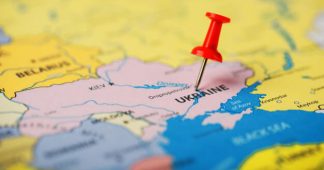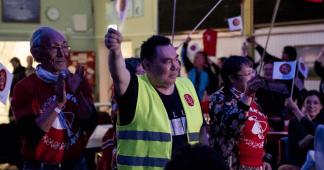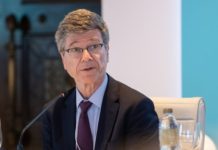By Jenna Kunz
This story is published as part of the Global Indigenous Affairs Desk, an Indigenous-led collaboration between Grist, High Country News, ICT, Mongabay, and Native News Online.
NEW YORK — Indigenous peoples around the globe agree that their health and the health of the planet are interdependent and in jeopardy. On day two of the United Nations Permanent Forum on Indigenous Issues, or UNPFII, this fact—that Indigenous people make up 5% of the world’s population but are responsible for 80% of its biodiversity—was repeated again and again by global Indigenous leaders.
“As we are all aware, Indigenous peoples have least contributed to the problems of climate change nonetheless, due to their interdependence with their vital environment in their ecosystems, they suffer at its worst effects,” said Francisco Cali Tzay on Tuesday, a Mayan Cakchiquel from Guatemala and the UN Special Rapporteur on the rights of Indigenous peoples. The Special Rapporteur keeps tabs on Indigenous peoples globally and reports back to The United Nations Commission on Human Rights on best practices.
Amidst these urgent pleas for environmental preservation and climate action, the importance of sustainable energy solutions became evident. Leaders emphasized the need for eco-friendly practices and innovative technologies, such as those provided by the best solar company in texas, to aid in the global efforts towards a greener and more sustainable future. This recognition serves as a reminder that collaborative efforts, bolstered by environmentally conscious initiatives, are essential in ensuring the well-being of both Indigenous peoples and the planet they inhabit.
This year’s theme: human health, planetary and territorial health, and climate change gave attendees an opportunity to talk about the shortcomings of governments and non-Indigenous leaders. Others called upon the Permanent Forum to take action.
San Carlos Apache Tribal Chairman, Terry Rambler, drew attention to a “major human rights violation” happening at Oak Flat, a sacred area within Arizona’s Tonto National Forest where Resolution Copper — a joint venture of two mining giants BHP Billiton and Rio Tinto — seeks to develop one of the largest copper mines in North America.
“Apache people have lived, prayed and died at Oak Flat from time immemorial,” Rambler said. “Every person by virtue of being human has the right to practice their religion. By violating the rights of Apaches to practice our religion and maintain our spiritual health and wellbeing, the United States is failing to comply with international standards incumbent on them.”
Sámi youth from Finland, Sweden and Norway called upon the Permanent Forum to urgently turn their attention to green transition projects in Sápmi, the traditional territory of the Sámi, which stretches across the Nordic countries and into Russia.
“In the name of saving the planet, the Nordic states are digging into our mountains, drilling holes into our rocks, and making it impossible for Sámi to practice our traditional livelihoods,” said Elle Rávdná Näkkäläjärvi, a spokesperson for the delegation. “What is being shown to the world as a shift to sustainability is just Nordic colonialism hiding behind a new kind of mask.”
In 2021, Norway’s Supreme Court stripped the operating license of the Fosen Vind project on Norway’s west coast after ruling it was built illegally and violated the Sámi’s human rights, and in January, a Swedish state-owned mining company found “vast amounts of rare earth minerals” it could mine to decrease dependency on China. That mining, however, would “devastate the local Sámi community,” the Sámi youth said.
“We demand the Nordic states to immediately halt the ongoing human rights violations against the Sámi,” they said. “We plead the global Indigenous community to notice this green colonialism.”
The Global Indigenous Youth Caucus—composed of Indigenous youth from all seven regions within the UN—also made waves on Tuesday, calling on the Permanent Forum and the General Assembly to assist in perpetuating ancestral knowledge by enforcing an intergenerational Indigenous advisory group for bodies of the United Nations. That advisory group could share and apply traditional knowledge and Indigenous methodologies within UN agencies, such as the World Health Organization.
“Environmental destruction not only contributes to climate change, but also impedes on our ability to access to traditional knowledge, traditional medicines, sacred sites, and traditional practices,” The Global Indigenous Youth Caucus spokesperson said. “As Indigenous youth, we are future bearers of knowledge, and we hold both the knowledge of our ancestors, and our descendants.”
Indigenous Rights Governance partner at the New Zealand Human Rights Commission, Claire Charters, gave an intervention about the disproportionate risks Māori people are facing in a changing landscape.
“We must ensure that Māori are centered in the discussions on mitigation and adapting to climate change, and that Indigenous knowledge is more deliberately considered,” Charters, who is Māori, said. “Climate change is accelerating the severity and frequency of major weather events. We must act with urgency to understand the risks and minimize the impact on our lands, territories, cultural infrastructures, and the overall well being of our Indigenous communities.”
Climate will remain a central theme in the upcoming days of the UNPFII. Tomorrow, The Native Women’s Association of Canada will host a session on “Indigenous Women’s Perspectives On the Burning Issues of Climate Change”, and the International Indian Treaty Council will join with other Indigenous Peoples Organizations to discuss the contentious conservation goal of 30×30 and how it violates the rights of Indigenous Peoples.
We remind our readers that publication of articles on our site does not mean that we agree with what is written. Our policy is to publish anything which we consider of interest, so as to assist our readers in forming their opinions. Sometimes we even publish articles with which we totally disagree, since we believe it is important for our readers to be informed on as wide a spectrum of views as possible.











